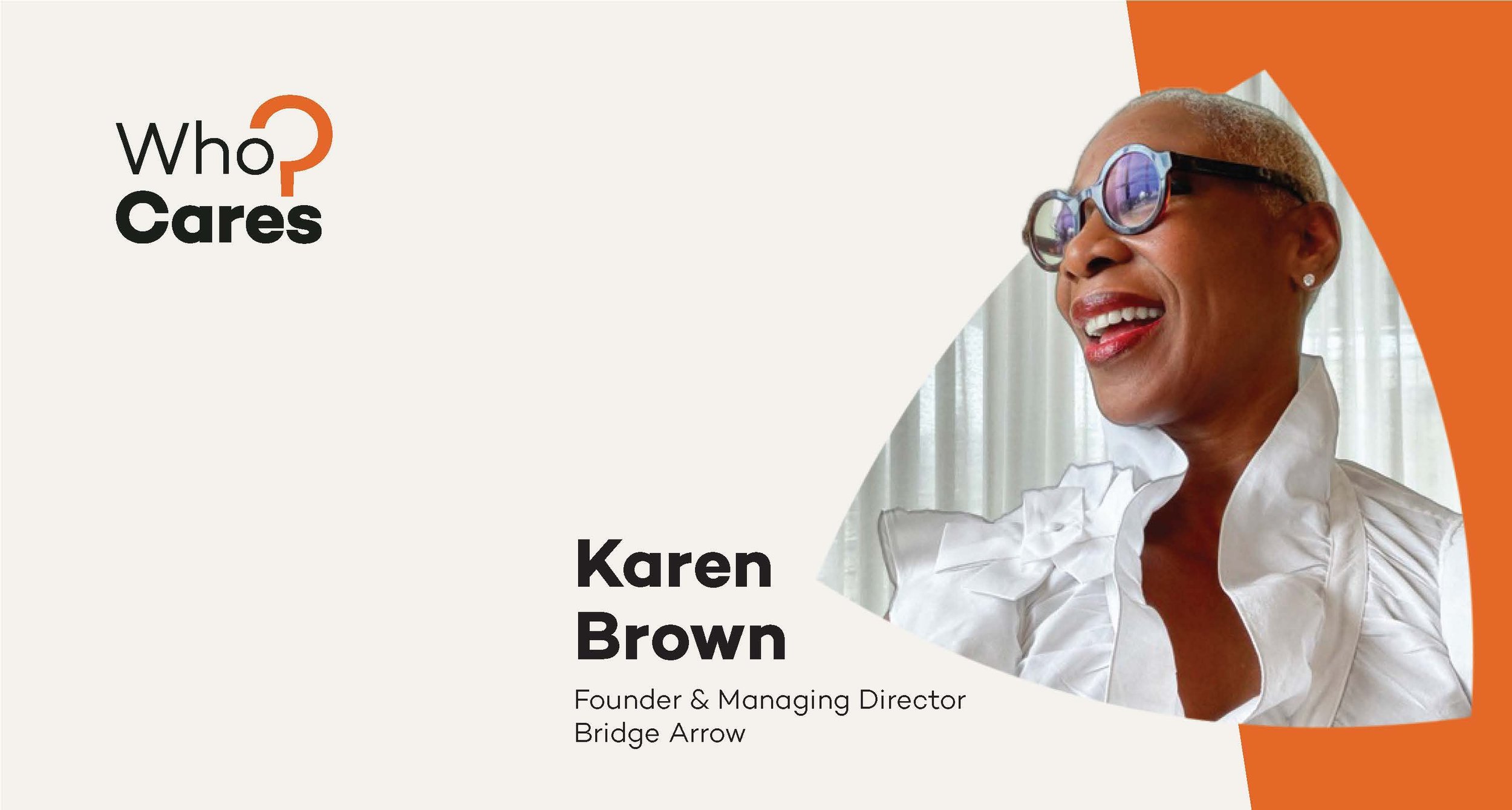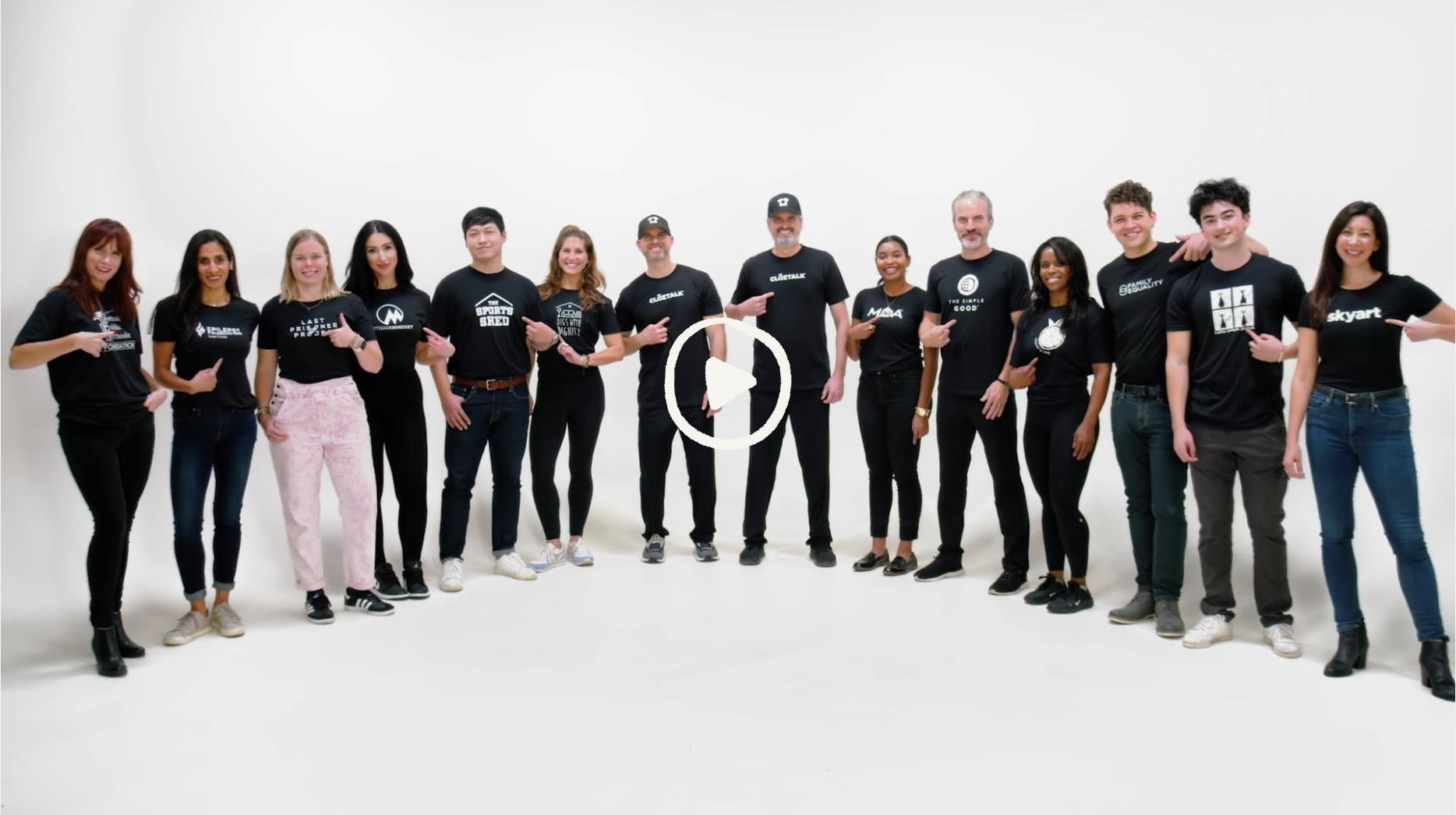Who Cares About DEI for Results?
We had a conversation with Karen Brown, Founder & Managing Director of Bridge Arrow; a professional consultancy dedicated to business & strategic transformation through Diversity, Equity & Inclusion. Karen has dedicated the past 20 years of her professional career to designing and activating DEI strategies that are tied to meaningful, measurable business results. In our conversation, she shared her insights on key questions connected to ‘DEI done right.’
Can DEI truly have an impact on business outcomes?
Who is the best type of person to lead DEI?
What are the foundational keys to a successful DEI strategy?
Brilliant insights from a person who turned down her first DEI offer… twice.
p3: How did you get into DEI?
Karen: When I was asked to apply for this job of diversity, many moons ago, I told the executive recruiter at the time, no, because I had never heard of the word diversity. And when I read the job description, I didn't understand a single word. But she came back to me twice and so to appease my friend Elaine, I said ‘Yes.’ That's it. I interviewed for the job, I got the job. And I'm not kidding you, that right now in this moment, I remember the day I started in this job and I knew this is what I was born to do.
p3: How and when did DEI initiatives emerge in the corporate world?
Karen: Companies have been working on diversity, equity, and inclusion for over 60 years. The original impetus for these efforts is the civil rights legislation of the mid 1960s. Now I won't go through the entire history between the civil rights movement up through now, but in short, some executives at the time felt a moral obligation to foster equality but I think most took steps to comply with the law. It was compliance-driven.
And so this has passed for decades as a business rationale for investing in women, racial and ethnic minorities and anti-bias and sexual harassment training. But it's hardly an inspiring one. Research even shows us; sociologists, Frank Dobin and Alexandra Kalev have documented the many ways that corporate diversity and anti-discrimination programs have fallen short and even undermined company's commitments to diversity, equity, and inclusion.
p3: Has progress been made or are companies still motivated by the same reasons?
Karen: What stood in the way of corporations doing it well 60 years ago, are the same reasons that stand in the way today. Many of them approach it just to keep lawyers and activists away or for compliance reasons in terms of the law. And some companies are approaching it for social justice only reasons; it's appealing to the heart of humanity. And whether they are doing it for compliance only or even if they're doing it for social justice reasons only, they approach it from only that standpoint. And what also happens then, is they often appoint the wrong person. So the wrong people leading the work - are doing the wrong things, and therefore nobody's satisfied because the results aren't meaningful.
p3: I have a feeling the right reason to do it is because there's actual value that comes from DEI if you do it right.
Karen: Oh yeah, absolutely. When you tie it to the performance of the organization, you absolutely can do extremely well. And I have reams of data and stories from my own way of approaching it, which is to link DEI to how a business is performing, what people care about, what they're measured for, how they're held accountable, whatever mission they are driving towards achieving. When you link it to what people care about, the problems they're trying to solve, it sticks and they stick with it.
p3: Are you saying then, that when you do it right, the social justice and the compliance, become a natural byproduct?
Karen: Yeah, I am. And I'm also saying that yes, when you focus on embedding DEI into who you are, how you operate, how you make decisions, the problems you're trying to solve, the mission you're trying to achieve, guess what? You're going to lower the possibility of being sued because you're not inclusive of X or you name it. When you are focusing on it from the standpoint of the business, you are naturally going to connect to the heart and appeal to the people.
p3: Do we tend to think of DEI in the wrong way?
Karen: Diversity is a fact. And a huge part of the importance in doing this work is helping people to understand what diversity is and what it's not. Most people think it is about women, black people and Latinos and maybe some who are sophisticated will throw in LGBTQ+.
A lot of people now would also include religion. All of who we are, are characteristics of diversity. We are all diverse. Inclusion is a choice. I choose to include you or I don't. And equity is about ensuring that you're providing benefits and resources based on the needs of the individual and different groups. So if you are focused intentionally on embedding and threading, DEI in who you are and how you operate and what you're trying to achieve, guess what? You are going to be sophisticated in understanding the diversity in your group and the diversity that's not, and you are going to make greater effort to include them because inclusion is intentional. So when you are focusing on achieving a goal and you are cognizant of the myriad of diversity amongst you, and then you offer benefits and resources based on the needs of the individual and different groups, and you make an intentional effort to include people, guess what? You get to the social justice piece because you're making people happy.
p3: What is possible in the way of real business outcomes? When DEI is done right, what is the potential benefit to an organization, beyond compliance and ethics?
Karen: It’s a long list. First, let me say that I'm an operations person first and foremost before I’m a DEI person. So when we focus on the business goals I'm going to help you, Mrs. Business leader, Mr. Business leader, to achieve your business goals. Whatever that may be over the next three years or five years or whatever, I'm going to help you, through DEI, to achieve those goals. This will naturally help you achieve greater customer and client satisfaction and will naturally help you achieve greater employee engagement. It's a long list. I just gave you three. But most importantly, know that all of these benefits are fundamentally tied to a business initiative first; something that is saving you money or helping you make money.
p3: What are some examples of how DEI can impact a business goal?
Karen: An example of diversity being tied to a business outcome… Say the company is planning to enter the Brazilian market. First, I use data for all the decisions that I make in my work. So I will look at things like the demographic representation of the board all the way down to the factory floor in a number of different ways and answer the question, how much of XYZ representation do we currently have, where, and who is missing? Adding personnel in key roles who speak the language, who know and understand this market, and who has power and influence can benefit you logically because you will have voices at the table that are representing this market. This is exactly what I did when I worked at one company which led to a new board member being appointed of a fortune 100.
p3: Who is responsible for promoting, designing and implementing DEI in a company?
Karen: A DEI leader, because you want someone to be just as responsible for leading, designing, implementing, and having accountability as you have somebody responsible for finance, as you have somebody responsible for your legal function. And senior leaders, starting with the CEO, they're responsible for leading and promoting. And yet the other side of that is everybody. Everybody is responsible and accountable for DEI in an organization, every single person. So I look at it the same way as I look at a company who's focused on safety, security, all these things that will make an organization function well, it is the same thing because DEI is about people.
So everyone is responsible for promoting and taking care of the organization, being one that is inclusive and equitable.
p3: The way you're describing diversity, equity and inclusion it is very strategic, it is tied to the business outcomes. So who should the company be looking for to put in that position?
Karen: It helps that this person has a sense of operations, how a business is run, how they make money, how the organization is working towards achieving a mission. So that's number one. Number two, it's important to have somebody who's trusted, who can build trust. And they must have an ability to influence because you're influencing from the board level all the way to the person who sweeps the bathroom floor. So if I had to say three things; they have to be trusted, have the ability to influence, and they must understand how a business makes money.
p3: Are there any foundation level fundamentals of a successful DEI strategy you have identified or uncovered in your work?
Karen: Yes, there are fundamental core things and, I would say first, the DEI strategy should be aligned with the priorities of the company. Why? Because that's what people are held accountable for. People can only focus on a few things. The board level and the executive level determines what those are. That's what their compensation is tied to. And so you want to meet people where they are. Anything outside of that is not going to get their attention.
The second thing that I find incredibly important is using data for all decisions. Data is the language of all business leaders. It's how we measure how we're performing. It's what they speak every day. It's what they tell to Wall Street. It is the business language of choice. So use data for all decision making in DEI as you would anything else.
And I would say the third bit is to give the same level of intentionality and seriousness and prudence and care and time that's placed into starting and running any department or business function or any other change initiative; give that same level of attention and intention to DEI.
p3: And what type of high level impact can DEI done right have on a business?
Karen: It can help you make money. It can keep you out of lawsuits. It can naturally help you with the retention of employees. It can help you with retention of business. I have so many stories of companies and leaders telling me of how they have lost businesses or they did not get a business because they weren't focusing on DEI.
When you're doing it right, it can help you understand the market share of our competitors and to understand the market share that no one's going after. There are just a long list of benefits for how DEI done well can help the performance, the financial performance of an organization.
p3: And that's why it's so important to strategically design your DEI. You don't just introduce it as a category to check the box. If you design it, there's power there, right?
Karen: Absolutely. And beyond financial performance, we often talk about the people performance. As human beings, we are built to process information in different ways. There are those people who process information externally, and there are those who process internally. I'm one of them, we need time, thinking time, processing time. When we think about that through the lens of DEI, it may mean that you have to send the agenda in advance so that I can process the information and prepare. In that meeting show up and ensure you are allowing silence for processing time. Some of us are outward processors or inward processors and it's neither good or bad, but fundamentally what you're not getting are the voices from key individuals. You are not getting the best outcome, the best ideas, the best information.
p3: And so it sounds like what you're saying is that diversity also means diversity of personality, diversity of characteristics as well.
Karen: Absolutely. We're born with the traits that we're born with, which we have no control over. And there are the acquired traits, the acquired traits of religion, education, where we choose to live, where we choose to worship, what activities we choose. These are acquired traits. So it's both inherited and acquired. So, diversity is about everybody. It's a fact of life. The opportunity lies in understanding who is missing. And so the most powerful question I share with my client is asking that question… ‘who’s missing?’
Who is missing in terms of country, in terms of gender, in terms of race, in terms of sexual orientation, in terms of thinking styles, in terms of processing styles, in terms of fill in the blanks. Based on what you are trying to achieve, what it is that you are going to deliver all along the way from ideation through to execution… Whose voice is missing? And if we can all ask that question, then what will happen is you will uncover your blind spots. It's a smart business choice.
p3: That's beautiful. You are saying they're missing because their voice matters in what you're trying to achieve. And you're going to have more success by including their voice.
Karen: Yes. I'm not saying that they shouldn't focus on social justice and they shouldn't focus on compliance. They're important, but employees tell me that they don't want to be selected. They don't want a promotion, they don't want to fill in the blank because of their race. They don't want this or that because of their gender. They want it because they are the best suited for it, that they are indeed qualified for that role, for that assignment, for that fill in the blank. So there is a downside to approaching it from a social justice only standpoint in that companies alienate the very people that they are supposed to be helping.
Inclusion benefits you because it's a smart thing to do. If you are missing the voice of a key segment of a population that is important to hear from in order for you to achieve your business results, why would you not want to include that voice? Why would you not want to include those voices? And that's what I mean by it's just the smart thing for you to do in order for you to achieve that which you are striving for.
p3: So would you say that what's going to make diversity and equity and inclusion retained socially, culturally for us as a nation or us as a world is going to be driven by results? Because that's what makes the world go round?
Karen: It is indeed, it's how businesses function - profit and nonprofit. Fundamentally, it is about ‘what have you done for me lately’?
p3: What would you say is the ‘DEI done right’ the bottom line?
Karen: Leaders can't run a business without people. You just can't. It's people who make the customer experience sweet or sour. It's people who make the profit. And so I highly recommend that every company have a ‘people first’ philosophy, which means you care about your people first. You talk about your people first in everything that you do. Meet your people where they are and provide the tools, the resources, the safety net for them so that everyone will come up better on the other side. We all benefit from DEI. And if you haven't figured it out by now… I love my work and I love to talk about it.
p3’s Takeaway
DEI can have an impact on business and mission outcomes when the organization approaches it from a business perspective. This begins by aligning your DEI strategy with your business/organizational strategy and identifying ‘whose voice is missing’ in the groups leading strategic initiatives.
When diverse voices are intentionally included, business and mission outcomes are achieved at deeper levels and the benefits to the culture become real, because people know they are being included based on the value they bring. ‘DEI done right’ results in heightened engagement, deeper investment, retention of people, retention of business and the ability to reach business objectives at a deeper level.
We met Karen while onset for a series of Promo videos we did for CLOZTALK; a purpose-driven apparel company promoting non-profit organizations. See Karen featured in this video:
















